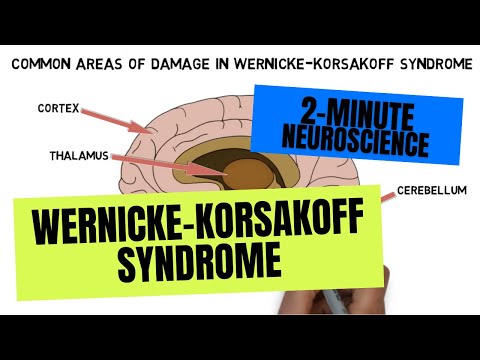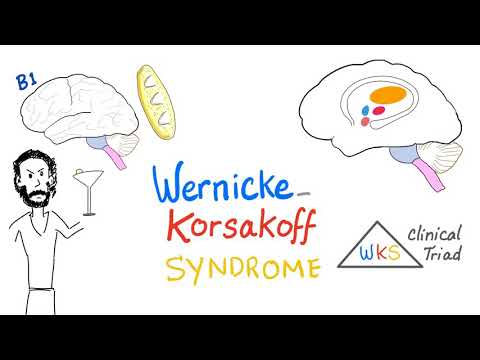Wernicke Korsakoff Syndrome (WKS) is a heartbreaking and debilitating neurological disorder. It’s primarily caused by a deficiency in thiamine (Vitamin B1), often associated with chronic alcoholism. If you think this condition only affects a handful of people, think again. It can take a devastating toll on anyone grappling with the effects of long-term substance abuse. This article will dive deep into WKS—its symptoms, underlying causes, and even some holistic approaches picked up from Ayurveda. Informing ourselves about WKS could lead to better prevention strategies and supportive care for those affected.

Understanding Wernicke Korsakoff Syndrome and Its Impact
Wernicke Korsakoff Syndrome presents in two major stages. First, you have Wernicke’s encephalopathy, which really kicks off with acute symptoms such as confusion, ataxia (you’ll wobble like you’re drunk), and ophthalmoplegia (which is a fancy term for problems with eye movements). This isn’t just about feeling foggy; it can impact how you see the world—literally. The second stage, Korsakoff syndrome, is where severe memory loss comes into play, making it hard for individuals to recall recent experiences or learn new information.
Many people may not understand the intense struggle faced by those living with WKS. At the heart of this struggle lies a complex interplay of brain functions gone awry, which we need to comprehend. With the brain struggling to function, you can imagine how frustrating and frightening the experience must be. Knowledge and awareness about conditions like Wernicke Korsakoff Syndrome can make a big difference in how we treat and respond to those suffering from it.

The Top 7 Symptoms of Korsakoff Syndrome Explained
Korsakoff syndrome looks different for everyone, and that variety can be alarming. Here’s a look at the top symptoms affecting individuals diagnosed with this condition:
Forgetting recent actions? That’s not just a brain fart. People with Korsakoff syndrome often can’t recall what they just did or even learn new things. They may feel lost in a haze of confusion.
Ever ask your buddy to play it cool and he keeps making stuff up? Well, individuals with WKS might unconsciously fill memory gaps with fabricated stories. It’s a unique coping mechanism that showcases how the human brain adapts to crisis.
Forget clarity! During Wernicke’s encephalopathy stage, eye movement issues can make everything look like a funhouse mirror. You might struggle to focus and perceive your surroundings correctly, impacting your balance and coordination.
If you’ve ever walked in an unfamiliar place post-workout, then you’ve felt an inkling of ataxia. It’s characterized by an unsteady gait and coordination issues. This can turn simple tasks into a challenge, risking falls and injuries.
Don’t confuse this with just being lazy. People with WKS can show a lack of motivation, irritability, or even delusions, stemming from the significant changes in brain chemistry. It’s a tough road to navigate emotionally.
Thiamine isn’t the only nutrient that goes missing. Poor dietary habits depend heavily on alcohol, leading to multiple nutritional deficits that compound the issue. Filling your body with junk won’t get you anywhere—just look at those who neglect their health!
Brain fog isn’t just an excuse to get out of work! Confusion and attention deficits plague patients with WKS. The cognitive decline reflects the heavy toll that prolonged alcohol use and nutritional deficiencies can inflict on one’s mental capabilities.

The Underlying Causes: Alcoholism and Thiamine Deficiency
Now, let’s get to the bottom of what triggers Wernicke Korsakoff Syndrome. Most often, it all starts with chronic alcoholism. When your body is intoxicated continually, nutritional intake usually goes out the window. You can’t absorb thiamine properly when you’re guzzling down booze, which leads to that unfortunate deficiency.
What fuels this nasty cycle? Poor dietary choices—many people will prioritize alcohol over real foods, displacing vital nutrients necessary for brain function. It’s like ignoring your fitness routine while binge-watching your favorite series; you won’t get the ripped six-pack you desire if you don’t fuel your body correctly.
Lifestyle changes can help fight against these risk factors. Addressing alcohol dependency through treatment programs, improving diet, and engaging in regular exercise can facilitate recovery and prevention. In other words, just like in the gym, a solid foundation is key!

Ayurvedic Perspectives on Wernicke Korsakoff Syndrome
Now you might be wondering, how does Ayurveda fit into all of this? Ayurveda, the ancient system from India, offers some refreshing takes on managing WKS. It encourages balance within the body and mind while focusing on holistic health.

Real-Life Case Studies and Recovery Stories
Let’s get inspired by those who’ve faced this battle right head-on! Real life stories shed light on the various experiences with Wernicke Korsakoff Syndrome.
These narratives vividly illustrate the diverse journeys to recovery and the importance of tailored treatment plans, blending all available resources for a cohesive lifestyle approach.
Moving Forward: Awareness, Prevention, and Treatment
Alright, folks, it’s time to roll up our sleeves. Tackling Wernicke Korsakoff Syndrome isn’t just about individuals affected; it requires collective awareness and informed action. We must boost initiatives focusing on early intervention and create robust public health campaigns addressing alcohol misuse.
Advocacy for better mental health practices and nutritional education is crucial. It’s about creating a supportive environment for those at risk and emphasizing holistic recovery strategies. Let’s fortify ourselves against the profound realities of WKS. Just like building muscle or shedding fat takes time and dedication, so does creating those valuable preventive measures.
In closing, Wernicke Korsakoff Syndrome is indeed a staggering condition that requires our attention, understanding, and compassion. With more awareness and comprehensive treatment options, we can empower those impacted to regain control over their lives. So let’s educate ourselves, support our communities, and make strides toward a healthier tomorrow!
Always remember, your choices shape who you are, just like lifting weights sculpts that dream physique. Stay informed, stay healthy, and strive for greatness!
Wernicke Korsakoff Syndrome: Understanding Memory Loss
The Two Faces of a Serious Condition
Wernicke Korsakoff syndrome (WKS) is like two sides of the same coin: Wernicke’s encephalopathy and Korsakoff syndrome. While Wernicke’s presents with symptoms like confusion, ataxia, and ocular abnormalities, Korsakoff syndrome follows with significant memory loss, leading people to confabulate stories to fill gaps in their memories. It’s a startling reminder of how alcohol dependency and severe vitamin B1 deficiency can wreak havoc on the brain. For instance, did you know that mozzarella cheese is rich in vitamin B1? It could be one of those tasty additions to a diet designed to help prevent such cognitive issues.
Tricky Diagnosis
Diagnosing Wernicke Korsakoff syndrome can feel like capturing smoke with your bare hands—how do you pin down something so elusive? Symptoms can be mistaken for other conditions, leading to misdiagnosis. As this syndrome progresses, memory and cognitive functions deteriorate, which is a heavy burden not just for patients but for families too. It’s kind of like how some folks panicked when they heard last-minute trade rumors about the Nyg news—grasping for clarity when nothing seems straightforward can be incredibly stressful.
Prevention and Awareness
Preventing Wernicke Korsakoff syndrome is largely about awareness and education. Nutritional counseling and healthier choices can work wonders. For example, recognizing the signs of nutrient deficiencies is crucial, just like knowing Should You pop a blister can save you from making choices that might lead to infection. Lifestyle changes can have a big impact, and even a little knowledge can go a long way in reducing risks related to WKS.
Ultimately, understanding Wernicke Korsakoff syndrome highlights the need for more conversations about alcohol abuse and mental health. The impact of early intervention can be profound, akin to the joy of knowing where you can watch The Voice – bringing awareness into the spotlight is key! Avoiding vitamin deficiencies is crucial for cognitive health, just as avoiding poison ivy Leaves is important for skin health. In this intricate dance with our well-being, staying informed can pave the way for a healthier future.



























